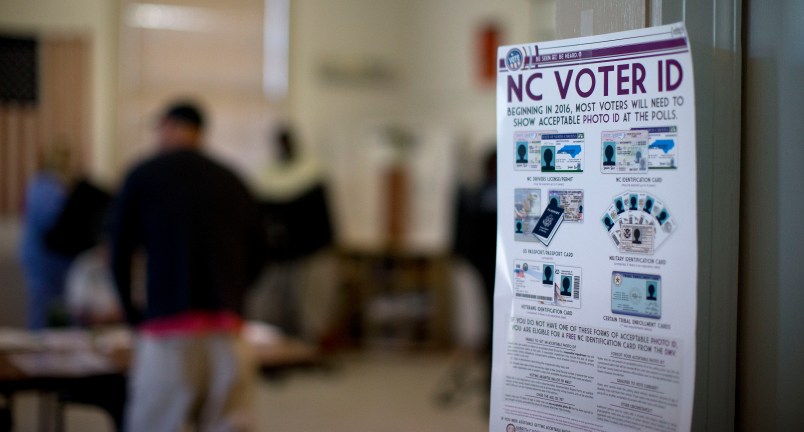RICHMOND, Va. (AP) — Members of a federal appeals court expressed skepticism Tuesday that North Carolina’s 2013 major rewrite to voting laws, requiring photo identification to cast in-person ballots, doesn’t discriminate against minorities.
The three-judge panel met Tuesday to hear arguments over whether to overturn an April trial court ruling upholding the law.
Judge Henry F. Floyd questioned the timing of the changes — done after Republicans took control of state government for the first time in a century and after the U.S. Supreme Court undid key provisions of the Voting Rights Act — and whether they weren’t done to suppress minority votes for political gain.
“It looks pretty bad to me,” Floyd said.
But the law’s authors said they were aiming to prevent voter fraud and increase public confidence in elections.
“It was not a nefarious thing,” said Thomas A. Farr, an attorney representing the state.
The U.S. Justice Department, state NAACP, League of Women Voters and others sued the state, saying the restrictions violated the remaining provisions of the federal Voting Rights Act and the Constitution. The 4th U.S. Circuit Court of Appeals fast-tracked the review in an expected presidential battleground state, with competitive races for governor and U.S. Senate.
Voters must now show one of six qualifying IDs, although those with “reasonable impediments” can fill out a form and cast a provisional ballot. The voter ID mandate began with this year’s March primary.
At Tuesday’s hearing, Judge James A. Wynn Jr. asked pointed questions about why public assistance IDs, used disproportionally by minorities, were not acceptable in the final version of the law.
“Why did they take it out?” asked Wynn, a former North Carolina state appeals judge.
The laws approved by the General Assembly and signed by Republican Gov. Pat McCrory also reduced early voting from 17 to 10 days, eliminated same-day registration during early voting and barred the counting of Election Day ballots cast in the wrong precinct.
The plaintiffs say the changes discourage voting by black and Hispanic residents, who use early voting or same-day registration more than white voters and are more likely to lack photo ID. Southern Coalition for Social Justice attorney Allison J. Riggs said North Carolina’s GOP lawmakers enacted a specific and unprecedented attack on minority voting rights that continued the state’s tradition of suppressing minority rights.
“They knew the disproportionate impact of every one of these provisions,” she said.
U.S. District Judge Thomas Schroeder, who presided over the trial in Winston-Salem, North Carolina, determined the plaintiffs failed to prove that the laws made it harder for minority voters to cast ballots. He focused on higher voter registration and turnout rates among black residents in 2014, when many changes were implemented, compared with 2010.
Attorneys for the state want to keep Schroeder’s ruling intact, arguing in a brief that the laws “simply returned North Carolina’s election system to the mainstream of election systems” used in the country.
The appeals panel, which also included Judge Diana Gribbon Motz, did not say when they would issue a ruling.
The same three judges considered the 2013 law in 2014.
At that time, Wynn and Floyd ordered a preliminary injunction directing same-day registration and out-of-precinct voting continue while the case was pending. A majority on the U.S. Supreme Court soon disagreed and blocked that order for the November 2014 election. But subsequent court rulings allowed same-day registration and out-of-precinct voting to resume.
___
Robertson reported from Raleigh, North Carolina.
Copyright 2016 The Associated Press. All rights reserved. This material may not be published, broadcast, rewritten or redistributed.







“It looks pretty bad to me,” Floyd said.
Then STOP IT!
It must be very taxing to enter a poll in NC.
I see what you did there, steviedee111.
Pretty much everything Republicans do is done to discriminate against minorities.
Bingo. Game, set, and match.